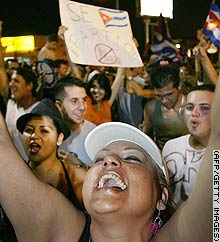|
|
Home | World | U.S. | Weather | Business | Sports | Analysis | Politics | Law | Tech | Science | Health | Entertainment | Offbeat | Travel | Education | Specials | Autos | I-Reports |
|
|
|
Home | World | U.S. | Weather | Business | Sports | Analysis | Politics | Law | Tech | Science | Health | Entertainment | Offbeat | Travel | Education | Specials | Autos | I-Reports |
|
Story Highlights• NEW: Commissioner: Idea to hold Orange Bowl event meant to ensure safety• NEW: Tomás Regalado: Event to follow Castro's death not "a party" • Cuban leader Fidel Castro not seen in public since July 2006 • People who have spoken to Castro insist the 80-year-old is recovering By Ashley Fantz CNN Adjust font size:
MIAMI, Florida (CNN) -- A Miami official said his idea of holding an event at the Orange Bowl when Fidel Castro dies has been misconstrued. "People are seeing this as the city pandering to a group of Cubans that want to celebrate Fidel's death and dance over Fidel's grave. That isn't the case." (Watch why Miami seems eager to celebrate Castro's passing The commission has approved the use of the Orange Bowl as an organized "gathering place" to help offset the chaotic street parties that have broken out when there is news about Castro's health's deteriorating, Regalado said. Miami is home to tens of thousands of Cuban-Americans who have been very vocal about their desire to say goodbye to the 80-year-old leader of Cuba. Born in Havana, Regalado came to Miami when he was 9 years old as part of Operation Peter Pan. Coordinated by the Roman Catholic Church and the U.S. government, it brought thousands of Cuban children to the United States in the early 1960s. Castro came to power in 1959 after leading a revolution overthrowing Fulgencio Batista. A place with meaningThe city of Miami owns the Orange Bowl, Regalado said, so taxpayers will pay no extra cost to host the event. The city is already working with police to make sure enough law enforcement is in place to handle all the impromptu parties that will spring up. "It's the responsibility of the city to direct people to one signature place, one safe place," he said. "People are going to celebrate and there's nothing we can do about that. All we want is a little order." The Orange Bowl has special significance to Cuban-Americans, Regalado stressed. President John Kennedy gave a speech in 1961 there promising a free Cuba. And in the 1980s, refugees stayed at the Orange Bowl who had arrived in Miami as part of the Mariel boatlift. The commissioner said there will be a "platform" for speakers though none have been booked and he has no one in particular in mind. He also said there will be musical performers but the entertainment would be more on the subdued side. "The music could be hymns," he said. Castro has not been seen in public since July 2006, when he handed power over to his 75-year-old brother Raul and underwent intestinal surgery. Although the Cuban government has been tight-lipped about his condition, reports have indicated Castro has been struggling through complications relating to the surgery. Those who have seen or spoken to him, such as Venezuelan President Hugo Chavez, insist he is recovering.  Cubans celebrate in the streets of Little Havana in Miami in August after hearing that Fidel Castro was ill and had relinquished power to his younger brother. RELATED |